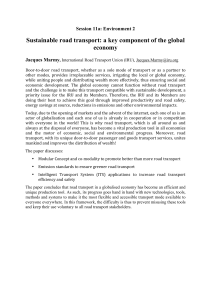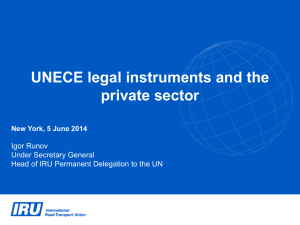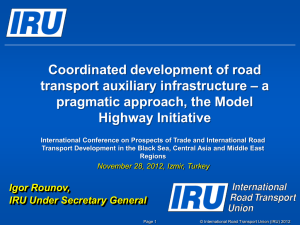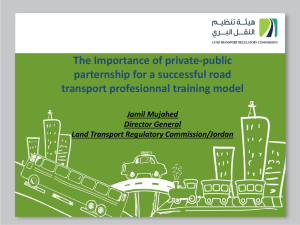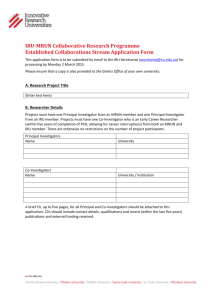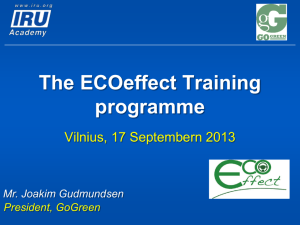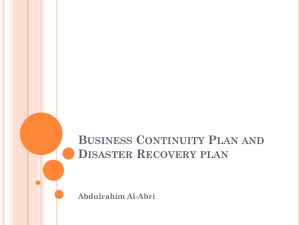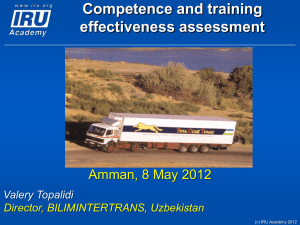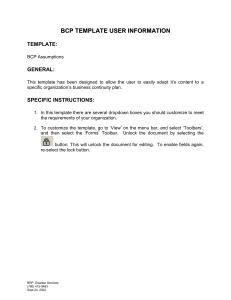Model Highway Initiative
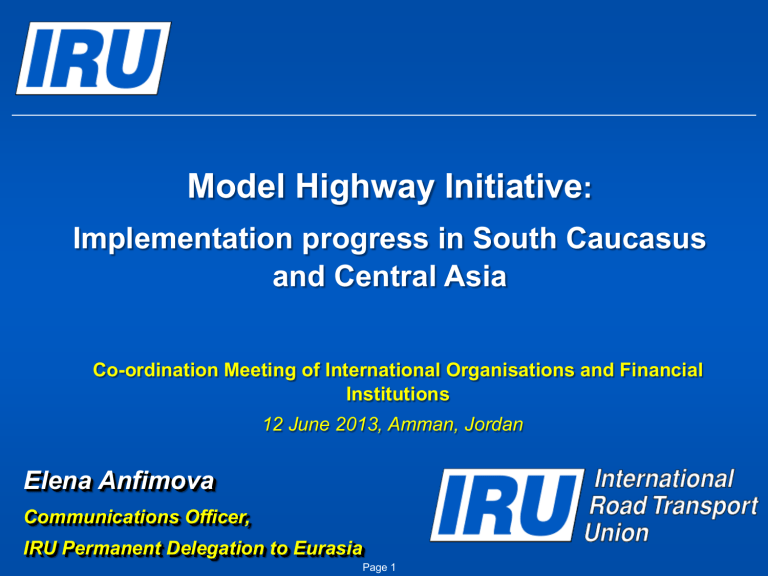
Model Highway Initiative :
Implementation progress in South Caucasus and Central Asia
Co-ordination Meeting of International Organisations and Financial
Institutions
12 June 2013, Amman, Jordan
Elena Anfimova
Communications Officer,
IRU Permanent Delegation to Eurasia
Page 1
Model Highway Initiative (MHI)
Page 2 © International Road Transport Union (IRU) 2013
Model Highway Definition
“ Model Highway is a chosen section (2-3 stretches) of an internationally rated trunk road of 1500 – 2000 km in length, crossing the territories of several Eurasian countries and of strategic importance for interconnecting and promoting
Eurasian trade and transit by road to major world markets.”
Page 3 © International Road Transport Union (IRU) 2013
MHI Key elements
1. Creation of modern ancillary roadside infrastructure
2. Institutional reforms and implementation of best practices in the road transport sector
3. Establishment of a multilateral investment mechanism
Page 4 © International Road Transport Union (IRU) 2013
MHI-SC section
• Rest area
• Service area
• Parking lot
• BCP
(border crossing)
• Dry port
• (logistics
• centre)
MHI South Caucasus (MHI-SC) section:
Trabzon - Sarpi ( Georgia/Turkey BCP ) – Batumi – Tbilisi – Krasny Most ( Georgia/Azerbaijan BCP ) - Baku
Possible extensions: Baku port ( BCP ) - Turkmenbashi port ( BCP ) - Ashgabat; Trabzon – Samsun
Decision of the Ministers of Transport of BSEC Member States
8. Assist to the implementation of transport, auxiliary and logistic infrastructure development projects in the BSEC region in cooperation with other international organizations and financial institutions with involvement of the business community, particularly on the basis of the public-private partnership, notably by inclusion of the IRU Model
Highway Initiative (MHI) into the future project of the BSRH Master Plan and cooperation in preparation of required feasibility studies.
Page 6 © International Road Transport Union (IRU) 2013
Prefeasibility Study on the development of MHI - SC
Pre-Feasibility Study presentations :
1.
Baku, Republic of Azerbaijan ,
October 30, 2012
2.
Tbilisi, Georgia ,
November 1, 2012
3.
Ankara, Turkey ,
November 14, 2012
Page 7 © International Road Transport Union (IRU) 2013
Pre-Feasibility Study:
Main conclusions
1.
Analysis confirmed the existence of imbalance in development between the main road infrastructure (basically roads) and roadside service’s assets
2.
Governments and international organisations have been paying practically NO attention to the problem of roadside ancillary infrastructure
3.
Private business is keen to take the initiative in the field of providing ancillary services along the roads
4.
Regional Infrastructure Fund was identified as the most effective mechanism for the Model Highway Initiative implementation
5.
Full-scale Feasibility Study required (based on the results of Pre-
Feasibility Study)
6.
The effective way to facilitation of international road transportation is implementation UN conventions and agreements
© International Road Transport Union (IRU) 2013 Page 8
MHI-SC Joint Statement
Signed in Izmir, Turkey on 28 November 2012
Page 9 © International Road Transport Union (IRU) 2013
First Meeting of the Working Group on creation of Model Highway on the Motor Road
Baku-Tbilisi-Batumi-Trabzon (MHI BTBT)
Page 10
MHI-CA section
• Rest area
• Service area
• Parking lot
• BCP
(border crossing)
MHI Central Asia section:
• Pol-eXomri - Nizhniy Panj
( Afghanistan/ Tajikistan BCP ) –
Dushanbe – Karamyk
( Tajikistan/ Kyrgyzstan BCP ) –
Bishkek – Kordai
( Kyryzstan/Kazakhstan BCP )
- Shimkent – Kzyl-Orda
Branches : Kordai – Almaty – Khorgos ( Kazakhsatn/China BCP ) Sarytash - Irkeshtam ( Kyrgyzstan/China BCP )
Prefeasibility Study on the development of Model Highway in Central Asia
Pre-Feasibility Study on MHI-CA presentations :
1.
Almaty, Republic of
Kazakhstan , 13-14 September
2012
2.
Dushanbe, Republic of
Tajikistan ,
17 September 2012
3.
Bishkek, Kyrgyz Republic ,
19 September 2012
Page 12 © International Road Transport Union (IRU) 2013
Major types of transportation
PPP and risks
Asset Sale
Full Service Long-Term Concession or Lease
High
Multimodal Agreement (Public-Public Partnership)
Joint Development Agreement (JDA – pre-development)
Transit-oriented Development (TOD – post-development)
Build – Own – Operate (BOO)
Build – Transfer – Operate (BTO)
Build –Operate – Transfer (BOT)
Design – Build – Finance – Operate (DBFO)
Design – Build – Operate – Maintain (DBOM)
Design – Build with Warranty (DB-W)
Design – Build (DB)
Construction Manager at Risk (CM@Risk)
Contract Maintenance
Fee – Based Contract Service
Page 13
Alternative
Project delivery approaches
Low
© International Road Transport Union (IRU) 2013
MHI Investment Mechanism
Government
• Consumers
Operation and management costs
• Operator
Support / Assets
Fares / Tolls /
Fees
Investment company
• Insurance premium
• Insurers
Debt
• Lenders
• Investors
10%-30% Equity
•
Dividends
Capital
Construction costs /divid.
• Construction companies
•
70-
90%
• Loan
Equipment costs /divid.
Capital
• Suppliers
Page 14 © International Road Transport Union (IRU) 2013
MHI what’s next?
1
Creation of the MHI coordination centres (Working
Group)
2
3
Consultations on the creation of the Regional
Infrastructure Fund (MHI RIF)
Preparation of the full blown Feasibility study
(Master Plan)
4
Intergovernmental Agreement negotiations
5 Development of national plans of administrative reforms
Page 15 © International Road Transport Union (IRU) 2013
MHI: connecting Europe and Asia
Page 16 © International Road Transport Union (IRU) 2013
www.iru.org
Page 17 © International Road Transport Union (IRU) 2013
